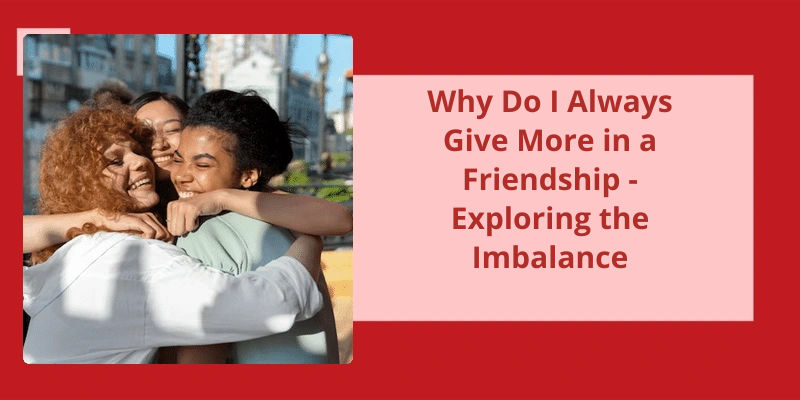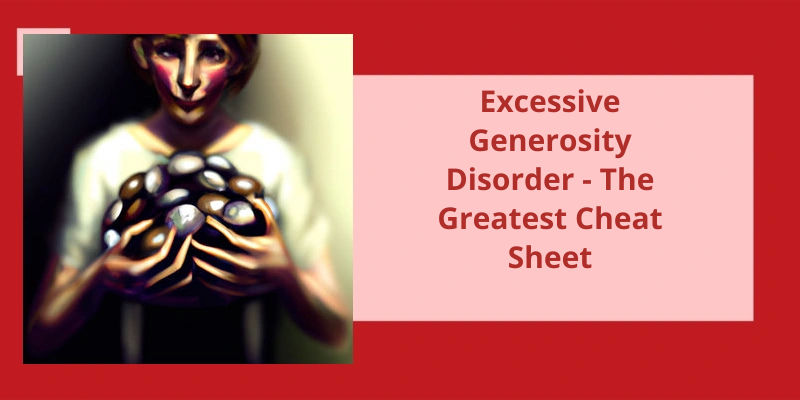Get more from them than you're able to give. It's natural to want to feel valued and appreciated by those around us, and friendships are no exception. However, giving more than you receive can leave you feeling drained and unfulfilled. You may be putting in more effort, time, and emotional investment into the friendship than the other person. Or perhaps you’ve a tendency to attract people who need more support and attention than they offer in return. There are many possible reasons why you might find yourself giving more in a friendship, and it's important to identify the underlying cause in order to find a more balanced and fulfilling dynamic.
What Does It Mean to Value Friendship?
Friends who value one another’s time and energy will make time for one another, regardless of distance, job demands, or family obligations. They prioritize meaningful connections and make room in their life for those who matter most. This sense of ease and comfort is one of the hallmarks of true friendship.
Trust: Friends who value one another trust one another with their thoughts, feelings, and secrets. They know that their confidences are safe, that their vulnerabilities won’t be used against them, and that they can speak honestly without fear of judgment or rejection. Trust builds over time, through shared experiences and mutual support, and is a crucial component of lasting friendships.
Empathy: Friends who value one another practice empathy and compassion. They listen to one another’s stories, offer emotional support when needed, and celebrate one another’s successes. They see things from each other’s perspective and understand that everyone has their own challenges and struggles. They work to build each other up, rather than tear each other down.
They stand by each other through thick and thin, offering a shoulder to cry on, a listening ear, and a helping hand when needed. They keep their promises, show up when they say they will, and make an effort to stay in touch even when life gets busy. Their friendship is a priority, and they work to maintain it over time.
Joy: Friends who value one another bring joy and laughter into each other’s lives. They enjoy spending time together, sharing stories, taking trips, and trying new things. They bring out the best in each other, encouraging each other to be their true selves and to embrace life with enthusiasm and optimism. Their friendship is characterized by good times, happy memories, and a deep sense of satisfaction knowing that they can count on each other always.
The Benefits of Valued Friendships on Mental Health and Well-Being
- Reduced stress levels
- Improved self-esteem
- Increased sense of belonging
- Enhanced mood and happiness
- Greater ability to cope with life’s challenges
- Boosted overall well-being
- Increased longevity
Friendship is an integral part of our lives. We share our joys, sorrows, and deepest secrets with our friends. We rely on them for support, comfort, and advice. But is friendship a moral value? Studies have shown that friendships play a significant role in our moral decision-making and social behavior. It goes beyond just a social connection; it shapes our character and our sense of morality. Let’s explore further.
Is Friendship a Moral Value?
The question of whether friendship is a moral value is a complex one that’s been debated by philosophers for centuries.
One important aspect of friendship as a moral value is the idea of loyalty. This includes being trustworthy, dependable, and always there for our friends when they need us. It also involves defending our friends when they’re unjustly attacked or criticized, even if it may be uncomfortable for us to do so.
This means being willing to give and receive support and help from our friends in times of need. It involves being a good listener, offering advice and guidance when needed, and being a source of comfort and support during difficult times.
This means recognizing and valuing our friends as individuals with unique personalities, interests, and perspectives. It involves treating them with kindness, understanding, and consideration, even when we may not always agree with their views or choices. Ultimately, this is the foundation for any healthy and fulfilling friendship.
The Role of Forgiveness in Friendship as a Moral Value
- Forgiveness helps to restore broken relationships.
- It reflects a mature outlook of handling conflicts and misunderstandings.
- Forgiveness promotes emotional well-being and inner peace.
- It leads to improved communication and healthier friendships.
- Forgiveness allows for personal growth and development.
- It fosters empathy and compassion towards others.
- Forgiveness helps to build trust and deepen friendship bonds.
- It demonstrates a commitment to values and principles of respect, kindness, and understanding.
- Forgiveness can enhance overall satisfaction and happiness in life.
Maintaining friendships can be a difficult task, as life often takes us in different directions. Even the closest of friends can lose touch over time, without any specific tension causing the separation. As we go through different phases in our lives, priorities change, and friendships sometimes fizzle out gradually. Research suggests that losing half of our friends every seven years isn’t uncommon. In this article, we explore the different reasons why friendships may come to an end, and how to cope with their loss.
How Do Friendships Normally End?
While some friendships may end due to conflicts or misunderstandings, the most common reason for friendships to fizzle out is simply due to changes in the lives of the individuals involved. As people grow and develop, they may change their priorities, interests or even their personality. This can lead to a gradual drift between two friends who were once close. For instance, a friend who was once passionate about outdoor activities may become more focused on their career, leaving little time and energy for their previous hobbies.
Another reason why friendships may end is due to significant life events such as a divorce or a job loss. During these times, friends may distance themselves as they’re unsure of how to support their friend or find it difficult to relate to what they’re going through. This can lead to an awkwardness that can be hard to overcome.
The Role of Communication in Maintaining Friendships
Communication plays a crucial role in maintaining friendships. Regular communication helps us to keep in touch with our friends, know about their lives, and share our thoughts and feelings. It allows us to build trust, understanding, and a sense of closeness with our friends. Good communication also helps us to resolve conflicts, express appreciation and support, and stay connected despite distance and time. Therefore, it’s essential to prioritize communication and make efforts to keep our friendships alive and well.
It’s important to recognize that friendships should be based on mutual respect and enjoyment, not on who does more for whom. If you’re struggling with feeling like you’re always the one reaching out, there are a few things you can try to shift the dynamic and improve your friendships.
Why Am I Always the One Reaching Out to Friends?
It’s important to remember that everyone has different communication styles and levels of social energy. Some people may not feel the need to reach out as often or may not put as much effort into planning hangouts, but that doesn’t necessarily mean they value the friendship any less. It’s important to communicate with your friends about how you feel and express your needs, but also to be understanding and respectful of their boundaries.
Another factor to consider is that friendships naturally ebb and flow. People go through different phases in their lives where they may become more focused on their career, family, or personal growth. These periods may result in less communication with friends, but it doesn’t mean they don’t care about the friendship. It’s important to not take it personally and to continue to be supportive and understanding when your friends are going through changes.
It’s also possible that you may be attracted to friendships with people who arent as invested in the relationship as you are. This can be a pattern that you may need to examine and address. Sometimes we settle for acquaintances instead of seeking out deeper, more meaningful connections. It’s important to prioritize relationships with people who share your values, interests, and level of investment.
Lastly, it’s important to remember that friendships require effort and compromise from both parties. If you consistently feel like youre the only one putting in the work, it may be time to reassess the balance of the relationship. Consider having an honest conversation with your friend about your concerns and see if they’re willing to put in more effort. If not, it may be time to reevaluate the nature of the friendship and whether it’s healthy for you to continue investing in it.
Overall, while it can be frustrating to feel like youre always the one reaching out to friends, it’s important to approach the situation with empathy and understanding. Be open to communication and compromise, evaluate if you’re attracting the right kind of friendships, and know when it’s time to reassess the balance of the relationship. With effort and intentionality, you can cultivate meaningful and fulfilling friendships.
The Importance of Setting Boundaries and Saying No in Friendships
It’s important to establish boundaries and feel comfortable saying no in friendships, as this helps maintain healthy relationships. It allows us to prioritize our own needs and wellbeing, while also respecting and valuing the boundaries of our friends. Without clear boundaries, friendships can become strained and even toxic. Saying no is a positive choice that allows us to maintain control over our lives and relationships, and ultimately leads to stronger and more fulfilling friendships.
It’s frustrating when friendships seem to be one-sided, leaving you feeling neglected and unimportant. But before cutting ties, it’s important to understand why this might be happening. There could be underlying issues at play, such as an unhealthy dynamic with your friend or unexpected stressors that are impacting their behavior. By recognizing these factors, you can take steps to improve the situation and potentially salvage the friendship.
Why Do I Keep Getting Into One-Sided Friendships?
One possible explanation for constantly entering into one-sided friendships could be related to ones own personality traits. For instance, individuals who’re people-pleasers might be more prone to accepting friend requests, even if the person in question isn’t invested in maintaining a reciprocal bond. Similarly, individuals who struggle with boundaries might find it more difficult to say no when being asked for help or support.
Another possibility could be related to the type of social circles one is involved in. Being part of a group that prioritizes popularity or status over genuine connection might make it more difficult to foster meaningful relationships. Additionally, a group dynamic might reinforce certain behaviors, such as being the “listener” or “helper” in a friendship, which can lead to imbalanced relationships.
Cultural and societal norms may also play a role in why one-sided friendships are so common. For example, women are often socialized to be nurturing and caretaking, which can sometimes result in unbalanced relationships where one party is consistently giving to the other. Additionally, social media and other forms of technology have made it easier to connect with people, but also more difficult to maintain deep and meaningful relationships.
It’s important to note that one-sided friendships can be emotionally draining and damaging to ones well-being. If you find yourself constantly entering into imbalanced relationships, it might be helpful to reflect on your own patterns and preferences. Additionally, setting clear boundaries and communicating your needs with friends can help ensure that relationships stay healthy and mutually beneficial.
Ultimately, establishing healthy friendships relies on mutual respect, open communication, and a willingness to invest in the relationship emotionally. By being intentional about who we surround ourselves with and how we interact with them, we can create more meaningful and fulfilling relationships in our lives.
How to End a One-Sided Friendship: Tips for Having Difficult Conversations and Moving on From Toxic Relationships
- Reflect on Your Feelings
- Identify the Patterns
- Have a Direct Conversation
- Set Boundaries
- Distance Yourself
- Focus on Other Relationships
- Seek Support
- Give Yourself Time to Heal
Maintaining healthy friendships is an essential part of life, but recognizing when a friendship is no longer beneficial can be difficult. If a friend consistently disregards your emotions or if the relationship causes distress, it may be time to reevaluate the friendship. Dishonesty and lack of trust are additional red flags that may indicate a need for a change in the relationship dynamic. Let’s explore some signs that suggest it’s time to let go of a friendship that doesn’t serve you well.
How Do You Know When Friendship Is Not Worth Keeping?
If you find that your friend is dishonest and doesn’t share important information with you, it’s likely that the friendship isn’t worth keeping. Trust is a crucial element in any relationship, and if your friend isn’t willing to be open with you, it can be difficult to maintain a meaningful connection. This can lead to feelings of frustration and disappointment, which can ultimately damage the relationship beyond repair.
Another sign that a friendship may not be worth keeping is if your friend is consistently negative or doesn’t support you. Friends should be there for each other during tough times, but if your friend is always complaining or putting you down, it can be draining and emotionally exhausting. You may find yourself constantly trying to lift your friend up, which can take a toll on your mental health and overall wellbeing.
If your friend isn’t respecting your feelings, it’s important to re-evaluate the relationship. Healthy friendships require mutual respect and understanding, and if your friend is dismissive of your concerns or doesn’t take your emotions into account, it can be a sign of a toxic dynamic. This can make you feel undervalued and unimportant, which isn’t a healthy foundation for any relationship.
In some cases, distance can also be a factor in determining whether a friendship is worth keeping. If you find that your friend isn’t putting in the effort to maintain the relationship, or if you’re constantly the one reaching out and initiating contact, it may be a sign that the friendship has run it’s course. It can be difficult to let go of relationships that have been meaningful in the past, but sometimes it’s necessary for both parties to move on and find new connections.
Finally, it’s important to pay attention to your own happiness and wellbeing when assessing the value of a friendship. If being around your friend consistently makes you feel drained or unhappy, it may be best to end the relationship. Ultimately, friendships should bring joy and positivity into our lives, and if it’s not doing that, it may be time to let it go. While it can be difficult to end a friendship, it’s important to remember that it’s ultimately better for both parties to move on from relationships that are no longer serving a positive purpose.
Coping With the Loss of a Friendship and Moving On.
- Allow yourself time to grieve the loss of the friendship
- Reflect on what went wrong in the friendship and learn from it
- Reach out to other friends or family for support and companionship
- Engage in activities that make you happy and bring you peace
- Consider seeking counseling or therapy to work through your emotions
- Remember that it’s okay to let go of toxic friendships and prioritize your own well-being
- Be open to new friendships and experiences
Conclusion
receive as much as you give. However, it's important to evaluate if your friendships are truly balanced and fulfilling for both parties involved. Giving more than your friends can handle may lead to burnout or a feeling of being taken advantage of. It's important to set boundaries and communicate openly with your friends about your needs and expectations. Remember that true friendships require effort and investment from both sides, and it's okay to reassess and let go of relationships that aren’t serving your wellbeing. Ultimately, the key to maintaining healthy and fulfilling friendships is finding a balance between giving and receiving, and focusing on mutual respect and understanding.






